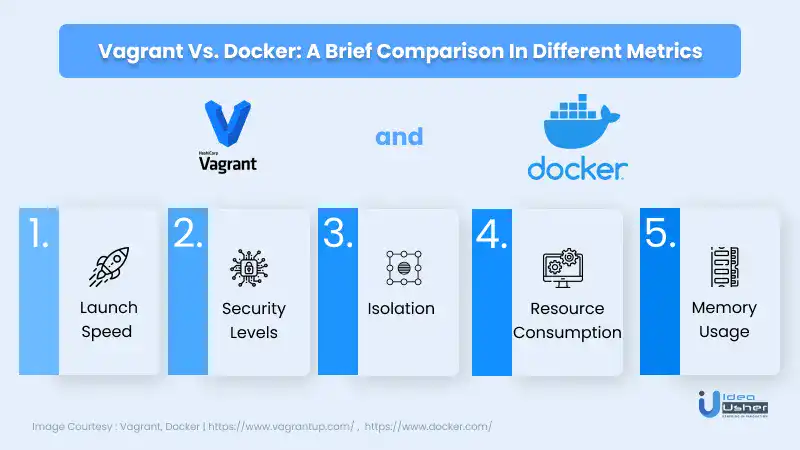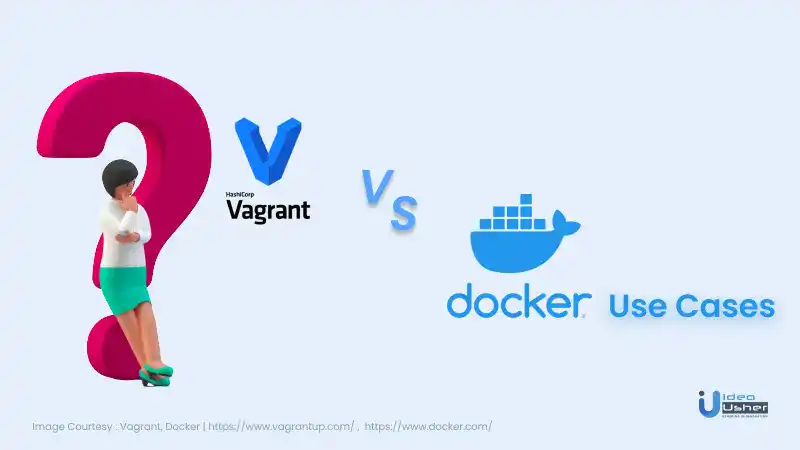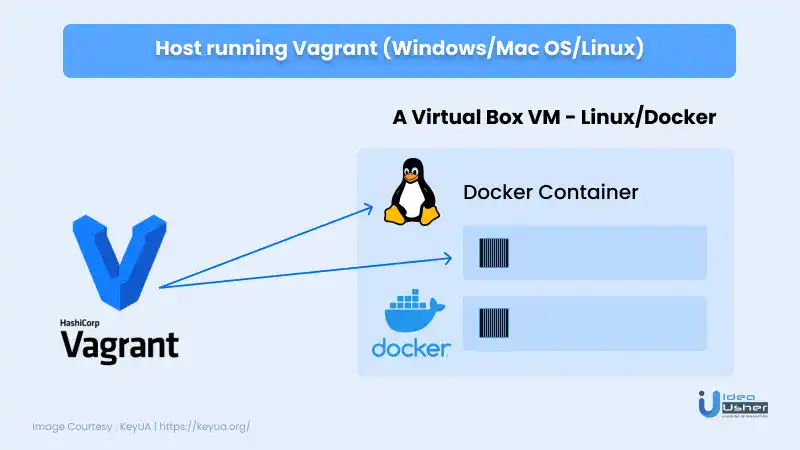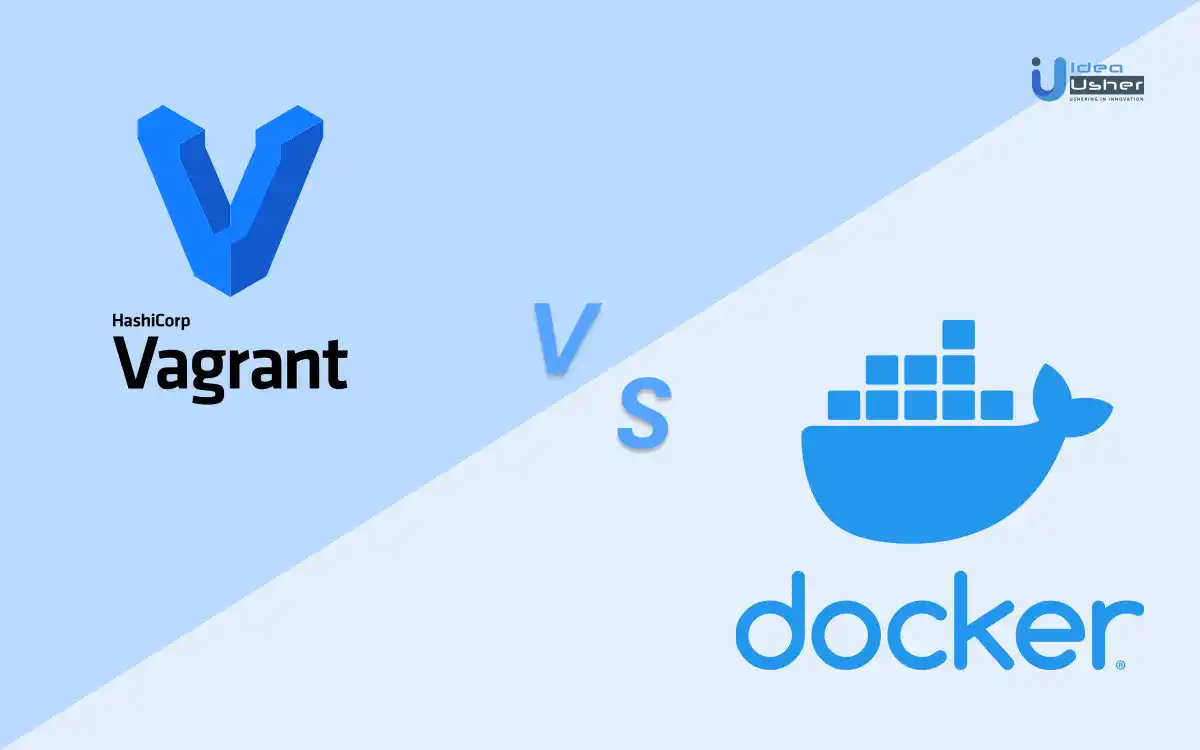Vagrant vs Docker. Which is the best?
Every developer may ask this question when they cannot decide which one to choose for building and running their project in a virtual environment.
To better compare Vagrant and Docker, you must understand both tools in detail. But first, let’s know why virtualization is necessary for application development. So, you can decide what virtualization features are essential for your project.
Why is there a need for virtualization?
When running software/applications, the system also runs all the libraries and dependencies the software contains.
Running the same software on different computers does not result in the same performance due to the various technical specifications of different devices. Sometimes the performance variations in other machines can create many problems for application developers, and that’s where the use of virtualization takes place.
Virtualization is the method of building a virtual version of a computing environment such as an operating system, execution environment, etc.
Virtualization delivers the same computing environment on different computers, making app performance predictable in every virtual environment.
However, there are many reasons to use virtualizations for your business, which are given as follows:
- When you use virtualization, you don’t need to purchase different devices for separate technology and operating systems.
- Virtualization will help you utilize your computing hardware resources to your full potential.
- Using a virtual system can help you to avoid the necessity of maintaining each physical hardware.
- The developers can increase their work productivity by having the ability to make a quick switch between operating systems and development tools within their system through virtualization.
Before knowing the difference between both the tools, let’s first understand Vagrant and Docker in detail.
What is Vagrant?
A vagrant is an open-source tool for building and managing a virtual development environment. Vagrant can run almost every virtual machine such as VirtualBox, AWS, VMWare, etc.
Developers can get the same application performance on every virtual machine that uses Vagrant. Vagrant is written in the Ruby language, which means anyone can download, modify, and share the configuration of a virtual environment that Vagrant creates.
Vagrant provides an easy-to-use development environment and automation, which helps in reducing the time for setting up a development environment. The configuration of the development environment of Vagrant is easy to set up and has greater portability which allows developers to share their development environment with their teams.
For DevOps engineers, Vagrant provides them with a consistent workflow environment for building and testing infrastructure management scripts.
Also, the developers can quickly test things like shell scripts, and virtualization tools such as VirtualBox or VMware. Moreover, the development environment of Vagrant is independent of the operating system which means developers can access the mutual development environment even if the system of all the developers are running on different operating systems such as Linux, macOS, or Windows.
The many virtualization features of Vagrant help users minimize the time required to set up the development environment, hence improving work productivity.
| Launch Date | 8 March 2010 |
| Written in | Ruby |
| Developed by: | HasiCorp |
| Supported OS: | Linux, macOS, FreeBSD, Windows |
Now, let’s learn about Docker.
What is Docker?
Docker is a system that allows developers to build servers and platforms for running their apps. The developers can run their applications on containers/sandboxes. Docker makes an image file of the programs and provides the necessary tools required for making an execution environment of that application.
Doctors’ platform is based on the concept of containerization. Docker uses containers that are nothing but code packages that come with all the necessary things that are needed at the time of executing an application code.
Docker provides a faster way to deliver your application consistently through the features of its containers. You can write your code locally and can share it with your team using Docker containers.
Moreover, the lightweight and fast nature of Docker provides a great option as an alternative to hypervisor-based virtual machines. Docker uses a client-server architecture to provide a virtual-based development environment for software programmers, giving a great way to reduce the time gap between writing and running code.
| Launch Date: | 20 March 2013 |
| Written in: | Go |
| Developed by: | Docker |
| Supported OS: | Linux, macOS, Windows |
After knowing both tools in detail, let’s check the major difference between Vagrant and Docker.
Vagrant vs Docker: What’s the difference?

Vagrant vs Docker: which one should you choose? The tool selection can be based on the application development approach, and each provides a unique benefit in virtualization and application development.
To make a clear distinction between Vagrant and Docker. Let’s compare a few points between both systems.
1. Launch Speed
Winner: Docker
Docker came here as a winner as it sets up a virtual environment in less time. Docker can be launched quickly in a minute without disturbing the functioning of different system components.
While in the case of Vagrant, developers need to reboot the Vagrant VM to run app execution. Additionally, the app needs to restart after the execution.
2. Security Level
Winner: Vagrant
Docker is less secure compared to Vagrant as the containers of Dockers utilize the Kernel of the operating system. There is always the risk of running malicious code within the container, which can also affect other containers.
Even Vagrant doesn’t offer any security measures. The developers themselves have to set up a secure environment in Vagrant, allowing developers to increase the environment’s security.
3. Isolation
Winner: Vagrant
The container of Docker acts as a virtual machine, but in reality, they are not a virtual machine. The Docker container is separated from each other and shares a kernel and operating system.
While in Vagrant, there is an ease in isolation for running apps in the virtual environment, as Vagrant is just a tool for creating virtual machines. The developers can build an entire virtual machine based on the level of isolation they want to implement.
4. Resource Consumption
Winner: Docker
Vagrant will take more computing resources at the beginning than Docker because it allows developers to build an entire virtual machine.
In the case of Docker, its containers share the kernel space, making them require fewer resources for setting up virtual environments.
5. Memory Usage
Winner: Docker
As Vagrant provides many development resources, there will be more memory usage in Vagrant.
In Docker, their container dictates the memory consumption, which results in better CPU and storage efficiency. For running apps of bigger sizes, it will be best for you to use Docker.
However, you can check the table to have a clearer idea of comparing these virtualization tools.
| Docker | Vagrant | |
| Virtualization | Linux container | Virtual machine |
| OS | Linux | Linux, Windows, macOS |
| Resource isolation | Weak | Strong |
| Starting Time | Seconds | Minutes |
| Building image time | Short (mins) | Large (10+ minutes) |
| CM integration | No | Yes |
| Size | 100M+ | 1G+ |
| Public Images | Yes(Docker Hub) | Yes (Vagrant Cloud) |
| Development tools | CoreOS, Mesos | Terraform |
To decide which tool can be best for your development project: let’s understand the use case of both virtualization tools.
Use cases of Vagrant vs Docker.

Understanding the use cases helps you decide what to choose between Vagrant and Docker in certain conditions. So, we can utilize the virtual environment efficiently by using these systems, starting the use case with Docker.
I. Docker
Let’s check the use case of Docker.
When to use Docker?
Docker is the best when you need to focus on:
- Consumption of fewer computing resources
- Quick app launching
- Web application development
- Easy collaboration between app development teams
When not to use Docker?
Avoid the use of Docker in the following cases:
- Small application projects
- A large portion of the development team is macOS users.
- Need complete control over the development environment
II. Vagrant
Let’s check the use case of Vagrant.
When to use Vagrant?
Vagrant is best when developers give priority to the following things:
- Better security levels
- Complete control over the development environment
- No limitations on building and using the virtual systems
When not to use Vagrant?
Avoid the use of Vagrant in the following cases:
- Quick app launching is high priority
- If you prefer less computing resource consumption
- Require effortless communication between development teams
Once you decide what to choose for your project development, let’s check how you can set up Vagrant and Docker. Also, it would be best for you to choose the proper methodology for your project.
How to set up Docker?
If you choose Docker, you can set up Docker for your system by following the given steps.
- Download & install Docker
- Start the Docker desktop tool.
- Create a Dockerfile
- Define services in Compose file
- Build and run your app with that Compose file.
How to set up Vagrant?
If you decide to use Vagrant, you can follow these general steps for setting up Vagrant for your system.
- Install VirtualBox on your system.
- Install Vagrant
- Make a local directory for Vagrant
- Make a Vagrantfile in the recently created directory
- Run “vagrant up.”
- Start provisioning your virtual machine.
It is also possible for you to use both Vagrant and Docker together to maximize the potential of taking benefits from a virtual application development environment.
How to use Vagrant and Docker together?

Both Vagrant and Docker are perfect competitors to each other. But the good thing is that we can use both platforms together through Vagrant Docker Provisioner.
Vagrant Docker provisioner automatically installs and pulls Docker images and performs various operations like running containers and file customization.
Using Docker and Vagrant together enables developers to use the advantages of both systems at the same time. So, for building and running complex projects in virtual environments, using Vagrant and Docker together would be a great choice.
Get the proper guidance on your project from IdeaUsher.
Choosing the right development tool for your project is the foremost step toward developing a successful project.
So, if you get stuck picking the right system for your project, connect with the experts at Idea Usher. And get the required assistance you need to kickstart your project, be it project management or development.
Build Better Solutions With Idea Usher
Professionals
Projects
Frequently Asked Questions
Let’s check the answers to the most asked questions to help you choose the right development tool for your project.
Q. Can we use Vagrant with Docker?
A: Yes, Vagrant supports Docker. A developer can use Vagrant with Docker through Vagrant Docker Provisioner.
Q. How many containers can Docker run?
A: A Docker can run upto eight containers per host.
Q. What is a Docker image?
A: The image in Docker is a file used to execute code in a Docker container. It contains all the dependencies required for running specific applications in Docker.
Q. What are the most popular Docker images?
A: The most used Docker images are as follows:
- NGINX
- Redis
- Postgres
- Fluentd
- Elasticsearch
- MongoDB
- MySQL
- Etcd
- RabbitMQ
- HAProxy
Q. What is the difference between vagrant and VirtualBox?
A: VirtualBox is open-source software used to create a virtual machine for running another operating system.
Vagrant is used for building and managing the development environment by running virtual machines such as VirtualBox, AWS, VMWare, etc.
























